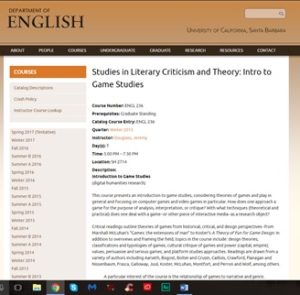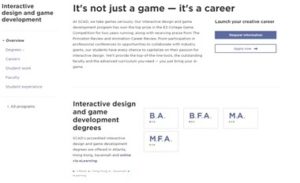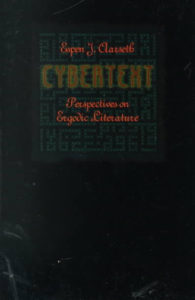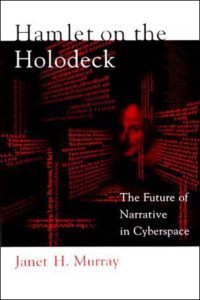Aarseth, Espen. “Computer Game Studies – Year One.” Game Studies, vol. 1, issue 1, 2001. http://gamestudies.org/0101/editorial.html. Accessed 20 September 2016.
While relatively short, Aarseth’s article ambitiously sets out to demarcate an official beginning for computer game studies as an “emerging, viable, international academic field”. Aarseth, known for his 1997 book Cybertext: Perspectives on Ergotic Literature, makes the case for formalized study of computer games as a field separate from, though drawing on, a range of related disciplines from computer science to anthropology, and film studies to aesthetics.

While the article seeks to define computer game studies as being something “too important to be left to” individual fields like English Studies, it also does not exclude scholars of literature, communication, and writing from being a part of the conversation. Indeed, to imply that English Studies has a greater claim on the field than other disciplines such as interface design, computer programming, animation, film studies, or sociology would be both selfish and unproductive, as they all have a role to play in the development of a truly interdisciplinary field. Aarseth warns against attempts by individual departments to stake a claim over Game Studies, pointing out that, “Making room for a new field usually means reducing the resources of the existing ones, and the existing fields will also often respond by trying to contain the new area as a subfield.” However, this seems to ignore the fact that the very sources of funding that make up these resources often come in the form of tuition dollars from students interested in a new major being drawn to a school, as well as research grants – largely absent in the case of English Studies, but more likely in new media fields, especially those with close ties to multimillion dollar industries.

But how does Aarseth’s establishment of this field impact, restrict, or invite the participation of English Studies scholars? He allows that with the development of a new area of study, everyone is a newcomer, stating, “We all enter this field from somewhere else … and the political and ideological baggage we bring from our old field inevitably determines and motivates our approaches.” But should we really consider methodologies, historical perspective, and knowledge of cultural context to be “baggage”? As English scholars, we have much to contribute to this field, whether it is the formalized study of language, a deep and rich understanding of storytelling conventions and traditions, or the ways in which digital literacies inform and shape our verbal and written interactions through the medium of a game. Aarseth’s point is well taken, though; we can bring with us the knowledge and methods that have served us well in the past, but we must enter into the conversation with an open mind, willing to consider and incorporate other disciplinary perspectives that are different from, perhaps even contradictory at first glance to our own.
Just as English Education studies cannot exclusively be claimed by either departments of English or Education, and Cultural Studies will always include contributors from the social sciences, arts, and humanities, Game Studies can prove to be a fruitful and fascinating area for English scholars to explore and contribute to, but we will never have exclusive rights to it – nor should we. Its essence is interdisciplinary and Aarseth’s article helps to define the field, its roots, and the contribution it can make not only to academia, but to the larger community. While it could not remotely be considered to be staking a claim over this new discipline on behalf of English departments, it has established the need for formalized study, research, and (implied, if not explicitly stated) pegagogy.
Additional Resources
A much later contribution to Aarseth’s Game Studies journal, “Game Definitions: A Wittgensteinian Approach” explores the many ways scholars have defined the concept of games.
Showing the way the field of game studies has branched out from Aarseth’s initial definition, “Feminist Game Studies: Defining the Field” similarly carves out a subfield within this new discipline.
“Extra Credits” contribution to the discussion of what a game is – in which Portnow disputes the usefulness of narrow definitions, and claims definitions are “the intellectual version of chasing your own tail”.



